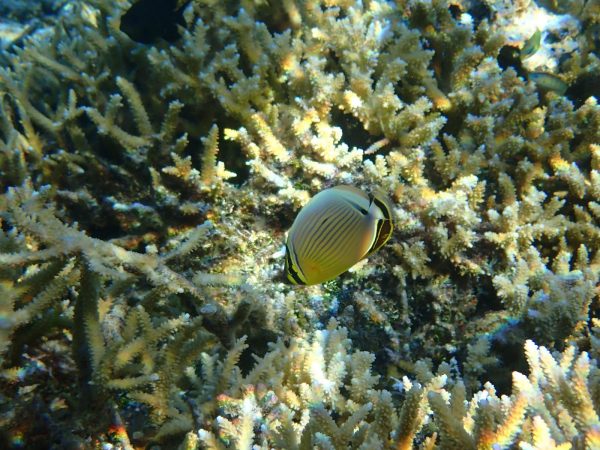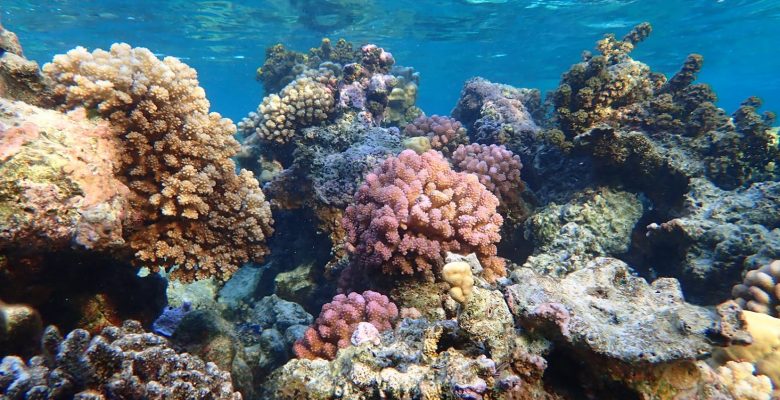By Laurie Henry
Like manure in fields, fish droppings could help improve the health of coral reefs, but it all depends on the fish in question. An astonishing discovery sheds light on the complex and particularly fragile relationships that corals have with their predators and other reef inhabitants. Between benefits and toxicity, the bacteria contained in fish faeces shape this ecosystem essential to human life.
Friendly predators and toxic friends!
A subtle game of balance has been established within coral reefs, where fish feeding on corals help the latter to protect themselves or heal themselves from diseases, according to a study carried out by the University of Rice.
Until now, scientists believed that coral-eating fish, corallivores, weakened reef structures by biting them, injuring them at the risk of causing them to die. But the corals also rub shoulders with fish called grazers, which feed on algae and detritus, and which were thought to be able to keep the reefs healthy.
Easily identifiable good and bad fish roles? Carsten Grupstra, lead author of the study published in Frontiers in Marine Science, cautions in a statement, “As it turns out, this doesn’t tell the whole story.”
Indeed, it is recognized that animal excrement is an important component of nutrient cycles and food chains, whether at sea or on land. So to better understand how corals can be impacted by the droppings of these corallivorous and grazing fish, the authors relied on two years of data from the field and laboratory experiments at Rice University and the station of research from Moorea, French Polynesia. They placed pieces of coral in jars containing germ-free seawater. In some they added fresh excrement from corallivores, in others they added fresh excrement from grazers. At the end of the experiment, the coral fragments from all the jars were examined and classified according to their condition.
These experiments showed that grazer feces could kill or suffocate corals in all jars. Corallivore droppings produced fewer and smaller lesions and rarely resulted in death.
Beneficial excrement
To understand these results, the microbes present in the excrement were analyzed. Those of the corallivores contained many bacteria present in healthy corals, which can in fact be considered as a supply of “probiotics” to the reef, like those beneficial to our health which populate our intestines.

A coral-eating butterflyfish on a reef in Moorea in July 2019. © Carsten Grupstra
And the entire reef can benefit from this important source of beneficial microbes! Indeed, as these predators are not at the very top of the food chain, they are also potential prey for larger animals. So always worried about being eaten themselves, they spend their days repeating a simple two-step process: take a bite and swim to a new place.
Because they relieve themselves as they go, they naturally disperse their droppings — and all the beneficial organisms they contain — over a wide area. Carsten Grupstra summarizes, “It’s analogous to fecal microbiota transplantation therapy in humans.”
An important discovery for conservation issues
The authors nevertheless qualify their comments because the harmful or beneficial effects could be limited if the excrement disintegrates, or is eliminated by another organism. A better understanding of the relationships within the ecosystem will allow reef managers to implement treatments that would promote beneficial effects and minimize negative impacts.
Carsten Grupstra says, “Together, these findings lead to a more nuanced understanding of the roles of fish on coral reefs and can help us better understand the interactions that occur on reefs around the world.”
Indeed, remember that to ensure their survival, corals are forced to live in symbiosis with algae, such as dinoflagellates. The latter nourish their hosts by sharing the food obtained by photosynthesis and simultaneously benefit from the protection of the corals.
Under the effect of global warming, corals bleach, expelling these algae considered as enemies and eventually die. The association of algae and corals is the key to safeguarding the latter and therefore coral reefs. And it is at the level of this symbiosis that the excrement of predators would intervene.
The authors have indeed discovered that a large quantity of dinoflagellates are present in their faeces and are therefore scattered all along the reef. Carsten Grupstra and Adrienne Correa, study co-authors and Rice University marine biologists, are conducting further research into whether contact with coral predator droppings could improve bleaching recovery rates and long-term health. term of corals.
Adrienne Correa concludes, “This tells us that we don’t really know all of the interactions that occur on coral reefs, and some species may be important to coral reef conservation in ways we hadn’t imagined.”
Source : Carsten G. Grupstra, et al., Consumer feces impact coral health in guild-specific ways. Frontiers in Marine Science. https://doi.org/10.3389/fmars.2023.1110346


